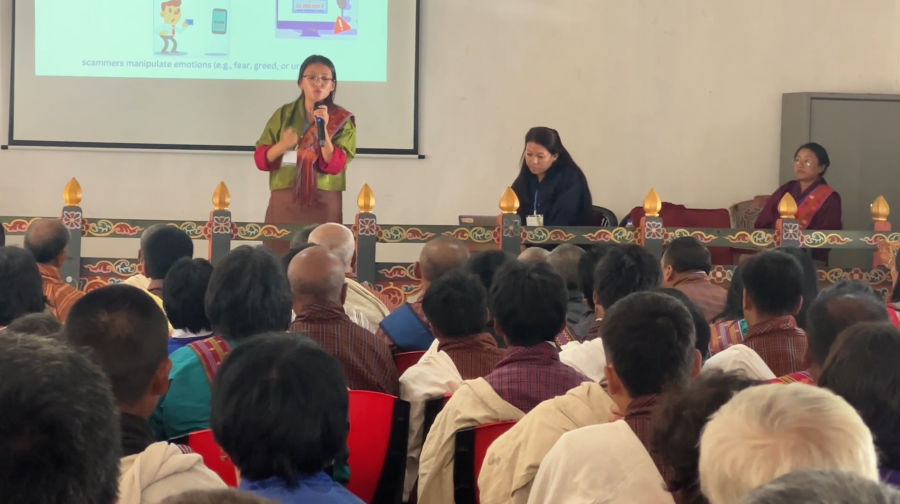 Despite continued sensitisation and advocacy, people continue to fall victim to online scams. The issue is more rampant in rural areas where the majority of smartphone and social media users lack digital literacy. In a continued effort to mitigate such scams, Jigme Namgyel Engineering College is conducting an awareness campaign in the east. Recently, a team from the college visited Ngatshang in Monggar, educating the public about cybersecurity.
Despite continued sensitisation and advocacy, people continue to fall victim to online scams. The issue is more rampant in rural areas where the majority of smartphone and social media users lack digital literacy. In a continued effort to mitigate such scams, Jigme Namgyel Engineering College is conducting an awareness campaign in the east. Recently, a team from the college visited Ngatshang in Monggar, educating the public about cybersecurity.
To make the awareness programme more engaging, the team communicated in the local dialect.
The rural residents were advised on the dos and don’ts on social media and how to handle unknown calls.
Not too long ago, a family in Ngatshang Gewog fell victim to voice phishing, a vishing scam and lost almost Nu 300,000. So far this year, two such scam cases have been reported to the relevant offices in Monggar.
“We got a call from an unknown man. They were asking us for our CID number and to confirm our mobile number. They said it is to update our bank account. However, knowing it is a scam, we immediately blocked the unknown number. The programme today highlighted that in such cases, we must report it to the police,” said Pema Yesel, a resident of Ngatshang Gewog.
“The word of our fellow villager falling victim to such a scam spread quickly. The victim is from our gewog and is our relative. The family lost two hundred eighty thousand ngultrum to a scam. Today, after attending such a meeting, we have understood the risks in this digital world. We were told to keep our passwords strong and how to deal with unidentified callers,” said another resident, Neten.
Ngatshang Gup Ugyen Yangzom said, “Relevant offices are continuously reminding us through various platforms to be mindful of such scams. But unfortunately, people still fall victim to such scams. We did not receive any formal complaints, but we got the information from one of the banks.”
Ngatshang Tsogpa Norbu said, “I think such a workshop should be held regularly because people tend to fall victim easily when they receive scam calls about a winning lottery. Now that we have attended the campaign, I am sure many will be mindful of it.”
The college representatives, in teams, visited six eastern districts, conducting sessions at schools, monastic institutions, and gewog.
“Just recently, we had a real case on our campus as well, and it happened right in front of our eyes. One of our colleagues received a call from a foreign number, they were pretending to be a Bhutanese and was asking for the ID number and PIN for our accounts. We recorded it and confronted the scammer on the spot,” said Tashi Yangchen, a faculty member with JNEC, Samdrup Jongkhar.
People were also sensitised on digital safety practices, including safe mobile use, strong password management, social media safety, two-factor authentication, and ways to handle and report cyberbullying.
The programme is a joint initiative of GovTech, BtCIRT and Jigme Namgyel Engineering College, with funding from Asia Pacific Network Information Centre and Information Society Innovation Fund Asia.
Namgay Wangchuk, Monggar
Edited by Phub Gyem








